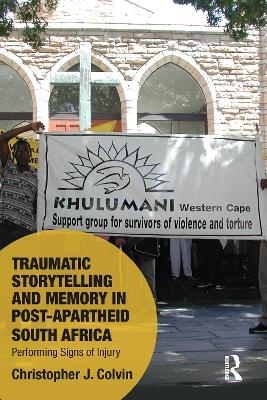
Traumatic Storytelling and Memory in Post-Apartheid South Africa
Performing Signs of Injury
Seiten
2020
Routledge (Verlag)
978-0-367-58214-2 (ISBN)
Routledge (Verlag)
978-0-367-58214-2 (ISBN)
This book explores the practice and function of traumatic story telling as part of the South African Truth and Reconciliation Commission, and the role it played in the lives of Khulumani as victims of apartheid-era political violence.
This book explores the practice of traumatic storytelling that emerged out of the South African Truth and Reconciliation Commission and came to play a key role in the lives of the members of the Khulumani Support Group for victims of apartheid-era political violence. Group members found traumatic storytelling both frustrating and yet also an important form of memory work that shaped how they saw themselves in the post-apartheid era. Drawing on ethnographic fieldwork, the author examines how traumatic storytelling functioned not only as a kind of psychological healing and national political theatre, but also as a potent form of social relation, economic exchange, political activism, and expressive practice. With emphasis on the personal, social, and political significance of the act of traumatic storytelling, this volume asks why members of Khulumani, despite their many disappointments, continued to engage intensively in storying their experiences for themselves and others. Examining what powers storytelling held for both group members and their witnesses, and considering the ways in which storytelling enabled new senses of self and new understandings of what was possible in the years after the end of apartheid, this book considers what we might learn more broadly from the experiences of Khulumani about the possibilities—and limits—of traumatic-memory-making as an instrument of personal, social, and political repair. As such, it will appeal to scholars of sociology, anthropology, and criminology with interest in justice and post-conflict societies.
This book explores the practice of traumatic storytelling that emerged out of the South African Truth and Reconciliation Commission and came to play a key role in the lives of the members of the Khulumani Support Group for victims of apartheid-era political violence. Group members found traumatic storytelling both frustrating and yet also an important form of memory work that shaped how they saw themselves in the post-apartheid era. Drawing on ethnographic fieldwork, the author examines how traumatic storytelling functioned not only as a kind of psychological healing and national political theatre, but also as a potent form of social relation, economic exchange, political activism, and expressive practice. With emphasis on the personal, social, and political significance of the act of traumatic storytelling, this volume asks why members of Khulumani, despite their many disappointments, continued to engage intensively in storying their experiences for themselves and others. Examining what powers storytelling held for both group members and their witnesses, and considering the ways in which storytelling enabled new senses of self and new understandings of what was possible in the years after the end of apartheid, this book considers what we might learn more broadly from the experiences of Khulumani about the possibilities—and limits—of traumatic-memory-making as an instrument of personal, social, and political repair. As such, it will appeal to scholars of sociology, anthropology, and criminology with interest in justice and post-conflict societies.
Christopher J. Colvin is an Associate Professor and the Head of the Division of Social and Behavioural Sciences in the School of Public Health and Family Medicine at the University of Cape Town, South Africa.
Preface
Acknowledgements
1. A Weekend in the Boland
2. Traumatic Storytelling at the TRC
3. From the TRC to the Trauma Clinic
4. Moral Economies of Traumatic Storytelling
5. Political Economies of Traumatic Storytelling
6. Traumatic Storytelling in Art, Prayer and Politics
7. Virtuous, Virtuoso and Virtual Subjectivities
8. The Uncertain Powers of Traumatic Storytelling
Conclusion
References
Index
| Erscheinungsdatum | 01.07.2020 |
|---|---|
| Reihe/Serie | Memory Studies: Global Constellations |
| Verlagsort | London |
| Sprache | englisch |
| Maße | 156 x 234 mm |
| Gewicht | 453 g |
| Themenwelt | Recht / Steuern ► Strafrecht ► Kriminologie |
| Sozialwissenschaften ► Politik / Verwaltung ► Europäische / Internationale Politik | |
| Sozialwissenschaften ► Soziologie | |
| ISBN-10 | 0-367-58214-7 / 0367582147 |
| ISBN-13 | 978-0-367-58214-2 / 9780367582142 |
| Zustand | Neuware |
| Haben Sie eine Frage zum Produkt? |
Mehr entdecken
aus dem Bereich
aus dem Bereich
wie wir unsere Mimik und verborgene Körpersignale entschlüsseln
Buch | Hardcover (2022)
Droemer (Verlag)
CHF 27,95


